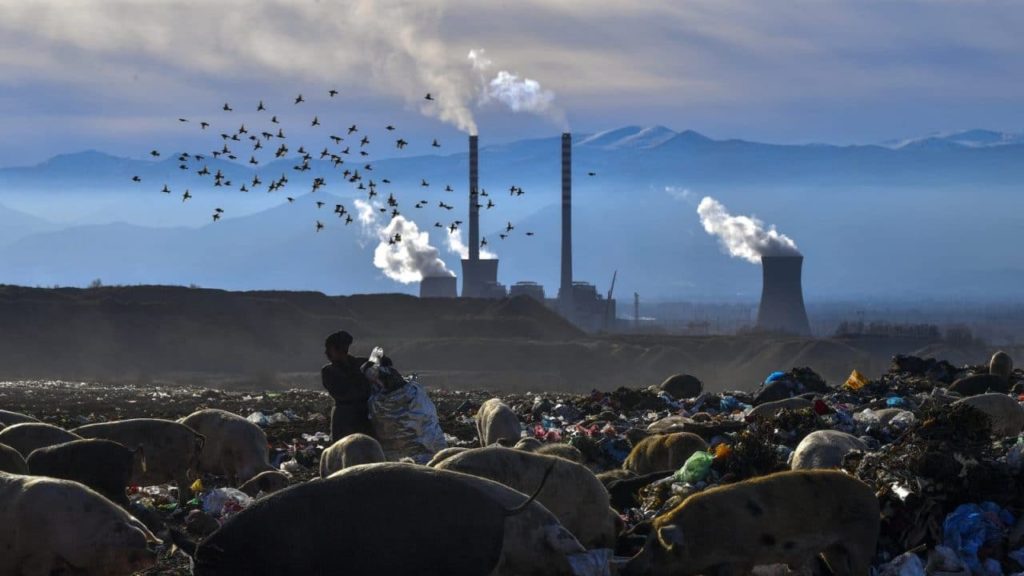It’s been said that bread-and-butter issues are what matter to voters in the former communist states of Eastern Europe. Political commentators point to this when they look at Green coalitions or parties in the former Eastern Bloc and their relatively poor showing in elections.
These voters, we are told, care about electricity prices and how much they pay at the supermarket on Saturdays. Bike lanes, paper straws and subsidies for solar panels are “boutique issues” for Green parties in Western Europe. There is some truth to this. But there is another issue that can deliver votes to Green parties in Eastern Europe that will resonate with their green colleagues in Germany.
To hundreds of thousands of voters in Bulgaria and other former communist states there is one thing that is worse than high electricity bills, expensive fuel or a woke supermarket that stops giving plastic bags for free, and that’s a homegrown communist on the payroll of the KGB (now Russia’s Federal Security Service or FSB).
One common theme we encounter when we read about Eastern Bloc countries after the fall of communism is the disillusionment that many voters felt after the transition governments failed to deliver on their promises. This led to a realignment of political forces that breathed new life into the old socialist parties that had never exited the political arena. To many, this was a repudiation of a sort of Darwinian capitalism that rewarded the well-connected and the unscrupulous. Older rural and city voters cast their votes for politicians who offered them the certainties of the past. Better to have a roof over one’s head and a decent pension than a Mercedes Benz dealership across the street where no one could afford to buy a car.
The appeal of these socialist parties and their policies started to wane again as new center-right parties started competing for power. These parties reached out to voters who could not, under any circumstances, bring themselves to vote for a Socialist, whether one of the old school or a reinvented “social democrat” with connections to the former party apparatus. Now in their late 50s or older, many of these voters still go to the polls in Eastern Europe. And the contempt they still feel for the system that Stalin built explains why many of them feel disappointed when a socialist government, or a coalition government with prominent socialists in key positions, comes to power. This is what happened in Bulgaria recently, and many voters are angry.
Having edged the other parties with 25.67% of the vote in the November 2021 election, the Harvard-educated Kiril Petkov and his newly-formed party, We Continue the Change, formed a “coalition of the honest” with Democratic Bulgaria, an electoral alliance that includes the Green Movement, the party of television host Slavi Trifonov and the Bulgarian Socialist Party. Petkov and his team ran a successful anti-graft campaign and voters came to the polls to express their anger against former Prime Minister Boyko Borisov and his GERB party.
Borislav Sandov of the Green Movement, a well-known environmental activist linked to the Save Pirin protests and the Bulgarian Climate Coalition, was appointed as Minister of Environment and Waters, a political first for a party that was until recently an anti-establishment alliance unsure whether or not it wanted to compete in parliamentary elections. A vocal and mostly urban minority, the Greens in Bulgaria have emerged as a viable civic and political force and have won victories against logging interests and no-holds-barred real-estate developers.
Angela Merkel could have said of Boyko Borisov what FDR reputedly said of Anastasio Somoza, Nicaragua’s former dictator: “He’s a son of a bitch, but he’s our son of a bitch.” This is the reason why Borisov cruised in and out of Brussels for years without so much as a slap on the wrist despite allegations of corruption and mismanagement back home. Borisov, a shrewd and folksy politician, knew how to handle his colleagues and funders back in Brussels. He didn’t have to make any ideological sacrifices to align himself with NATO and the EU, two institutions that he and his voters believed in from the start. So his job in Brussels, as far as he was concerned, was to show Merkel and other leaders that he was a reliable, low-maintenance ally who could be counted on for important votes in the Council.
700,000 active GERB or pro-Boyko voters is not a negligible amount in a country with just under 7 million people. A reliably anti-socialist bloc, many of these voters cried foul after Petkov formed a coalition with the Socialists or BSP. Older voters across Bulgaria immediately saw their suspicions confirmed when Petkov offered ministerial posts to the hated BSP, including the important Ministry of the Economy and Industry to Korneliya Ninova, the chairwoman of the BSP. To many GERP voters in Bulgaria, this was the invisible hand of the Kremlin at work.
Also, it didn’t help that Rumen Radev, formerly of the BSP, was reelected as President of the country, a post that makes him commander-in-chief of the Bulgarian Army and symbolic head of state. Radev made headlines when he failed to condemn Russia’s invasion of Crimea during a debate, only to issue a statement of clarification later.
Russian influence
The GERB critics, for all their talk of “KGB agents” and conspiracy-mongering, have a point: Russian influence in Bulgaria is real. In 2014, when Volen Siderov and his far-right Ataka party competed in an election, billboards with Siderov’s angry face appeared overnight all over Sofia. A Russophile and Eurosceptic, Siderov launched his campaign in Moscow and came back to Bulgaria flush with cash for his unsuccessful media blitz.
Furthermore, it is well-known that Bulgaria is entirely dependent on Russian gas (can we say that Western Europe is semi-dependent?), most of which is supplied by the TurkStream pipeline that runs across the Black Sea. (The Stara Zagora-Komotini pipeline, which would bring Azerbaijani gas to Bulgaria, is still under construction, after many inexplicable delays.) There have been investments in wind and solar capacity. But not nearly enough for a country blessed with the same amount of sunlight as Greece. Not long ago the EU Commission initiated an infringement procedure against Bulgaria after the government hastily awarded a contract to a Russian energy firm linked to Gennady Timchenko, the Russian billionaire and Putin ally on the U.S. sanctions list.
The Russian influence in Bulgaria does not stop there: Russian investors own thousands of properties across Bulgaria. Farms, hotels, vacation homes and apartments on the Black Sea coast. I know of a vineyard in the slopes of the Sredna Gora range that is co-owned by a Russian, a luxurious place built with EU Structural funds. Russian tourists lay wreaths beneath the monumental statue of the Russian soldier Alyosha, the liberator of Bulgaria or the harbinger of Stalinist communism, depending on who you ask.
In short, if anyone tries to downplay the Russian influence in Bulgaria or Bulgaria’s ties to Russia, they would do well to read more about the Bulgarian Socialist Party and other nationalist parties and what they think about NATO, the EU, the invasion of Crimea or “senile” Joe Biden.
Lacking an ambitious state policy to revolutionize the energy sector, Bulgaria will remain an energy dependency of Russia for the foreseeable future and many political forces inside the country will continue to do Putin’s bidding. Prime Minister Petkov has signaled that Bulgaria will no longer tolerate tax evasion by Lukoil, the Russian energy firm that has allegedly under-reported profits in Bulgaria for almost a decade and currently under investigation by the Bulgarian Commission for the Protection of Competition.
Despite this, the new coalition government has done little to prioritize the necessary energy transition and is seemingly in no hurry to change the energy status quo. (Just last year, while he was part of a caretaker government appointed by Radev, Petkov signed a petition in support of a coal complex in central Bulgaria that burns brown coal, the most polluting type of coal.) The Green Movement and their allies, now in government, have a role to play here. They can mobilize their base and build support for this transition within the government.
Looking forward to future elections, they might even win unexpected voters if they take on Putin and his cronies head on. And the message is clear: Bulgaria needs to strive towards clean energy and energy independence, and will not tolerate the corrupt networks of fossil-fuel patronage to extend all the way back to the Kremlin.
Fossil fuels are the reason why Russians fly into Sofia in private jets to bend EU law and try to steer the affairs of the country in their direction. Borisov, Radev, Ninova — the old communists and the right-wing nationalists — they’re all in the pocket of the fossil fuel conglomerates. Borisov, for all his pro-EU talk, is a chum of the like-minded Putin, something the U.S. Embassy in Sofia has taken note of over the years. As for Ninova, she made headlines not long ago after she criticized EU sanctions against Russia.
Young, urban voters in Sofia might raise an eyebrow when an uncle from the countryside blames the “KGB agents” who call the shots in Sofia. But, as it turns out, these older voters are not far off the mark. These “latter-day Soviet commissars” and securocrats are still around. But they’re no longer working for COMECON or the KGB. They’re on the payroll of the energy companies and state-owned banks that keep Putin’s autocracy afloat.
There are many parties trying to win these anti-socialist voters, and Russia is doing what it can to feed them lies about climate change and the inevitable energy transition. The Green Movement needs to counter these disinformation campaigns and stake out political ground between the center-right admirers of Putin and the Russophile socialists. In so doing, they’ll remind voters and their coalition allies — “the Harvards” and Slavi Trifonov — that much is at stake when it comes to energy independence, including Bulgarian autonomy, democracy and the stewardship of Bulgaria’s treasured natural wonders.


